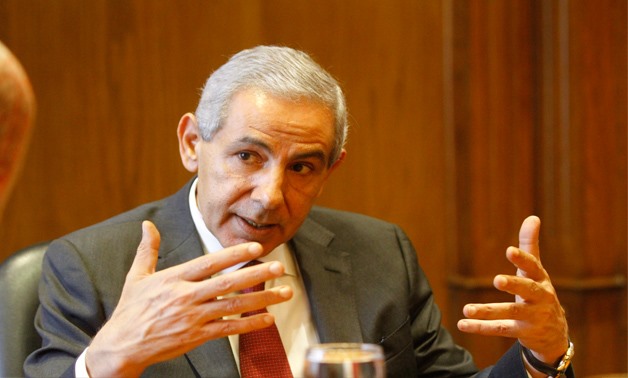
FILE- Minister of Industry Tarek Kabil
CAIRO – 30 May 2018: Trade Exchange between Egypt and Britain recorded £447 million ($593.22 million) during the first quarter of 2018, compared to £414.8 million during the first three months of 2017, Minister of Industry and Foreign Trade Tarek Kabil said.
The minister clarified that trade exchange between the two countries reached £1.86 billion in 2017.
British investments in Egypt are mainly in sectors of industry, services, construction, tourism, finance, agriculture, telecommunications and information technology, Kabil noted.
Kabil added that the economic reform program carried out by the government put Egypt back on the investment map as one of the most important investment destinations regionally and internationally.
The Egyptian government took many steps to configure business environment and investment in Egypt through passing a law to facilitate the issuance of industrial licenses and the new investment law, in addition to launching the first map of industrial investment in Egypt.
Egypt passed a new investment law in 2017 that offers foreign investors a bundle of incentives that include tax breaks and rebates; it also deals with bureaucratic problems, promises the simplification of procedures, and provides guarantees for investors.
As per the investment plan, Kabil launched in 2017 the industrial investment map, which includes details about available opportunities in the industrial sector. The map included 4,136 investment opportunities in eight industrial sectors.
Kabil stressed on the importance of enhancing the strategic partnership between Egypt and Britain to deepen the trade movement between the two countries, in addition to studying the future of their relationship in light of Brexit.
Brexit is a combination of two words, “British” and “exit”, and refers to the withdrawal of the United Kingdom from the European Union. In June 2016, the British electorate voted to leave the EU with a percentage of 51.9 percent.
He added that the two governments seek to reach an agreement that will preserve the gains achieved in the framework of the Egyptian-European partnership agreement and open the way for enhancing joint economic cooperation to achieve the interests of both countries.
The new agreement should include priority sectors as finance, electronic trade and transportation which promote cooperation and flow intra-trade, besides overcoming investment barriers and encouraging more investments between the two countries, according to Kabil.
For his part, British Investment Minister Graham Stuart said that the Brexit would not affect the joint economic relationship between Egypt and Britain, stating the Egypt is one of Britain's most important partners in the Middle East.
He added that cooperation between the two countries will develop in many fields, especially with regard to the development of industrial zones and small and medium-sized enterprises.
"The UK and Egyptian trade relationship continues to go from strength to strength, with the total trade between our two countries growing by nearly 6% between 2015 and 2016," Stuart said.
"That’s why it’s important to ensure continuity and certainty in our current trade arrangements as we leave the EU, and UK and Egyptian officials have made excellent progress in this. I’d like to thank Egyptian officials for their cooperation and hard work," he added.
"As we leave the EU and create a new independent UK trade policy, we will build further on our £3 billion of annual trade with Egypt, and continue to work closely together to champion free trade," British Investment Minister said.
On May 14, Kabil said that Britain is currently investing $5.6 billion in Egypt through the implementation of 1,450 projects.
The Egyptian-British Chamber of Commerce (EBCC) stated on Thursday, May 24, that Egypt’s exports to Britain recorded £202 million in the first quarter of 2018, with an increase of 23 percent compared to the corresponding period of 2017.
Egypt's imports from Britain decreased 4.8 percent, reaching £257 million during the first quarter of 2018 compared to the corresponding period of 2018.

Comments
Leave a Comment